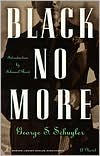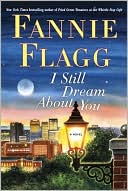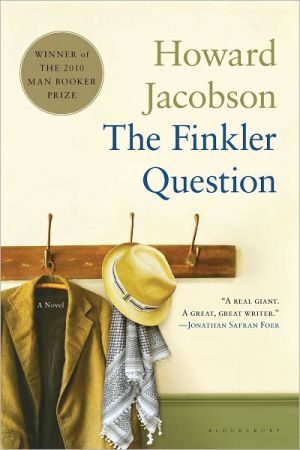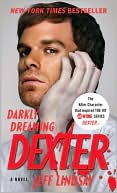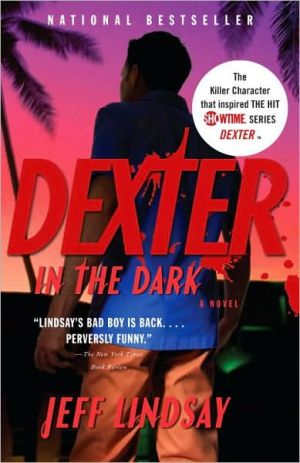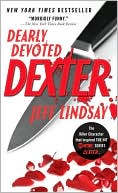Black No More
Modern Library Harlem Renaissance\ What would happen to the race problem in America if black people turned white? Would everybody be happy? These questions and more are answered hilariously in Black No More, George S. Schuyler's satiric romp. Black No More is the story of Max Disher, a dapper black rogue of an insurance man who, through a scientific transformation process, becomes Matthew Fisher, a white man. Matt dreams up a scam that allows him to become the leader of the Knights of...
Search in google:
A hillarious exploration of the bizarre events which occur when blacks literally 'disappear' from society.Kirkus Reviews37575380.X99 Schuyler, George BLACK NO MORE First published in 1931, this scathing satire on race embodies all the controversial notions of its author, the grouchy journalist and essayist Schuyler, a kindred spirit of his mentor and fellow misanthrope, H.L. Mencken. Best know for his dissenting essay, The Negro-Art Hokum, Schuyler (1895-1977) mocked most of the more prominent representatives of the Harlem Renaissance, and asks in this rollicking bit of speculative fiction: What if black people could change themselves to white? Inspired by popular products for skin-lightening, Schuyler imagines the discovery of a process that transforms Negroes into white people, and then watches all hell break loose. When Dr. Junius Crookman promises a three-day makeover, Max Disher, a dapper insurance agent with a taste for yallah gals, thinks of one thing all the ofay girls he can now pursue, especially a snobby cracker who snubbed him in a Harlem night club. For fifty bucks, Max is one of Crookman s first patients and emerges from his Frankenstein-like office with his new pork-colored skin. But Max s glorious new adventure turns ugly right away: his old friends reject him; his landlady accuses him of no race pride, and worse he finds white people less courteous and less interesting. The country too grows increasingly hysterical: the South calls for congressional action, and the infrastructure of Negro philanthropy begins to crumble. Scuyler smartly postulates the response of official black leadership, and saves his most damning portraits for characters who represent Garvey, DuBois, and Booker T., all of whom ultimately give in to the new process. Max s dilemma issimpler: he tries to figure out a way to capitalize off his new identity, and soon becomes the right hand man to the Rev. Givens, the grand poobah of the Knights of Nordica, and eventually marries his daughter, the very same girl from that night in Harlem. One problem remains, the whitening process doesn t pass to babies, so Max lives with the fear that his offspring will be his undoing. Not to worry, though, for events overwhelm all in this increasingly outrageous novel. As the hypocrisies mount, and the number of Negroes diminish, calls for racial purity increase. But the frantic researches into genealogy have an unintended result and one that Schuyler himself constantly argued that most white people have dusky ancestors, or as the Rev. Givens so aptly puts it, I guess we re all niggers now. Schuyler s miscegenetic ideas on race fuel this well-written look at chromatic democracy, a novel that prefigures both Ray Bradbury and Ralph Ellison. This wild book is much more than an historical curiosity, and its resurrection is a revelation.
\ From Barnes & NobleRediscover a Renaissance Classic \ Overflowing with wit and sarcasm, Black No More—George Schuyler's 1931 bombshell—stands apart. One of the most misanthropic novels of the Harlem Renaissance era, it delivers withering criticism with comic ingenuity. Politicians, intellectuals, entrepreneurs, leaders—nobody is spared Schuyler's poison pen. Outrageous, provocative, raucous, Black No More is a thunderbolt across the generations.\ By all accounts, the controversial Schuyler took pride in his nonconformist stance. In the spirited introduction by Ismael Reed, Schuyler is described as having an "independent vision." Well, only his unique vision could produce an elaborate satiric romp out of one simple question: "What would happen if all of America's blacks could turn themselves white?" This is the essence of Black No More.\ Believing that "there were only three ways for the Negro to solve his problem in America: to either get out, get white or get along," the industrious Dr. Junius Crookman, a black scientist, discovers that "getting white" could be the most lucrative of the three. Subscribing literally to the maxim "If you can't beat 'em, turn into them," he invents a concoction capable of transforming the darkest person into a straight-haired, white-skinned American. After all, the abundant ads for skin lightening creams and hair-straightening pomades in local black weeklies prove that blacks want and need change. "Seek and ye shall receive!"\ So, Max Disher, a "dapper, smooth coffee-brown Negro," becomes one of the first to transform from an enterprising Harlem black man into an upwardly mobile white man—privy to all good things American, including white women. At first, life as the newly transformed Matthew Fisher is surprisingly daunting. His Harlem landlady chides him as a betrayer of the race, other blacks are suspicious of him, and the white patrons at a local club seem boring compared to the liveliness of the uptown blacks. But, for Fisher, the raison d'etre is to find and seduce the "green eyed titan blond" who once rejected him as a black man.\ Fisher's sojourn takes him to Atlanta. Short on money and ideas, he spies a sign that means opportunity and direction: "Want 10,000 Atlanta White Men and Women to Join in the Fight for White Race Integrity…ADMISSION FREE." Surprise, surprise. Fisher not only locates the object of his affection but also easy access to wealth and prestige.\ His hustle eventually lands him the honorific of Grand Exalted Giraw with the Knights of Nordica, a title with no clear meaning but long enough to imply importance. As the opportunistic Fisher ascends the ranks of the Southern Order of Nordica, Dr. Crookman's sanitariums proliferate in the North. In the "Land of Milk and Honey," both discover that America's obsession with white supremacy is not such a bad thing after all.\ Naturally, such transformations cause a maelstrom of reactions—alliances are formed and broken daily. Within these unbelievably funny tales of hypocrisy, Schuyler's criticisms are launched with full force. "Those who had always maintained that it was impossible to get Negroes together for anything but a revival, a funeral or a frolic, now had to admit that they had cooperated well in getting white. There had been revived some of the same spirit of adventure prevalent in the days of the Underground Railroad." Pity the white factory workers, who otherwise would unite under the banner of unionism; they are unable to overcome their paranoia that black-men-recently-turned-white are infiltrating what Schuyler terms "the new Siberia." Even sexual promiscuity decreases. Everyone is suspect.\ Schuyler reserves his most caustic writing when making fun of the leading "black intellectuals" and their unfaltering race pride. His most hilarious passages are thinly disguised descriptions of prominent leaders like Marcus Garvey—a.k.a., the crafty Santop Licorice, who encourages all blacks to go to Africa although he himself has never been. W.E.B. DuBois' alter ego, Dr. Shakespeare Agamemnon Beard, is similarly castigated as a fraud: "In limpid prose, he told of the sufferings and privations of the downtrodden black workers with whose lives he was totally and thankfully unfamiliar. Like most Negro leaders, he deified the black woman but abstained from employing aught save octoroons."\ With equal grace and venom, Schuyler skewers America's politicians. Tawdry Democrats and slimy Republicans bed down with the Knights of Nordica and Crookman, respectively. "As the Democratic slogan was White Supremacy and its platform dwelt largely on the necessity of genealogical investigation, the Republicans adopted the slogan: Personal Liberty and Ancestral Sanctity.\ By writing Black No More, Schuyler ridiculed the very people, organizations and ideas that many Americans applauded and respected. The black intelligentsia. America's political powers. Southern gentility. Northern benevolence. He details the absurdities of race and its entrenched significance in American life. Like Dickens, Schuyler's names are brilliantly pointed—blacks sit at Niggerhead Café drinking their white mules while listening to "The Black Man Blues."\ Absurd, brazen, astonishingly funny, Black No More is a precious gem. And with every race-tinged headline today, Schuyler's classic novel gains fresh currency, 70 years later. The calendar changes, but people's phobias and foibles do not. A Founding Father's "dark secret" emerges, sparking debate. Time magazine digitally alters O. J.'s skin tone for a cover photo. Racist Texaco executives are caught on tape. "Profiling" and "DWB" enter the national lexicon. For Schuyler, contemporary obsessions and fears would feel all too familiar.\ —Glenda Johnson\ Glenda Johnson is a frequent contributor to the Africana section of Barnes & Noble.com.\ \ \ \ \ \ Kirkus Reviews37575380.X99 Schuyler, George BLACK NO MORE First published in 1931, this scathing satire on race embodies all the controversial notions of its author, the grouchy journalist and essayist Schuyler, a kindred spirit of his mentor and fellow misanthrope, H.L. Mencken. Best know for his dissenting essay, •The Negro-Art Hokum,• Schuyler (1895-1977) mocked most of the more prominent representatives of the Harlem Renaissance, and asks in this rollicking bit of speculative fiction: What if black people could change themselves to white? Inspired by popular products for skin-lightening, Schuyler imagines the discovery of a process that transforms Negroes into white people, and then watches all hell break loose. When Dr. Junius Crookman promises a three-day makeover, Max Disher, a dapper insurance agent with a taste for •yallah gals,• thinks of one thing•all the •ofay• girls he can now pursue, especially a snobby cracker who snubbed him in a Harlem night club. For fifty bucks, Max is one of Crookman•s first patients and emerges from his Frankenstein-like office with his new •pork-colored skin.• But Max•s •glorious new adventure• turns ugly right away: his old friends reject him; his landlady accuses him of no •race pride,• and worse•he finds white people •less courteous and less interesting.• The country too grows increasingly hysterical: the South calls for congressional action, and the infrastructure of Negro philanthropy begins to crumble. Scuyler smartly postulates the response of official black leadership, and saves his most damning portraits for characters who represent Garvey, DuBois, and Booker T., all of whom ultimately give in to the new process. Max•s dilemma issimpler: he tries to figure out a way to capitalize off his new identity, and soon becomes the right hand man to the Rev. Givens, the grand poobah of the Knights of Nordica, and eventually marries his daughter, the very same girl from that night in Harlem. One problem remains, the whitening process doesn•t pass to babies, so Max lives with the fear that his offspring will be his undoing. Not to worry, though, for events overwhelm all in this increasingly outrageous novel. As the hypocrisies mount, and the number of Negroes diminish, calls for racial purity increase. But the frantic researches into genealogy have an unintended result•and one that Schuyler himself constantly argued•that most white people have dusky ancestors, or as the Rev. Givens so aptly puts it, •I guess we•re all niggers now.• Schuyler•s miscegenetic ideas on race fuel this well-written look at •chromatic democracy,• a novel that prefigures both Ray Bradbury and Ralph Ellison. This wild book is much more than an historical curiosity, and its resurrection is a revelation.\ \
